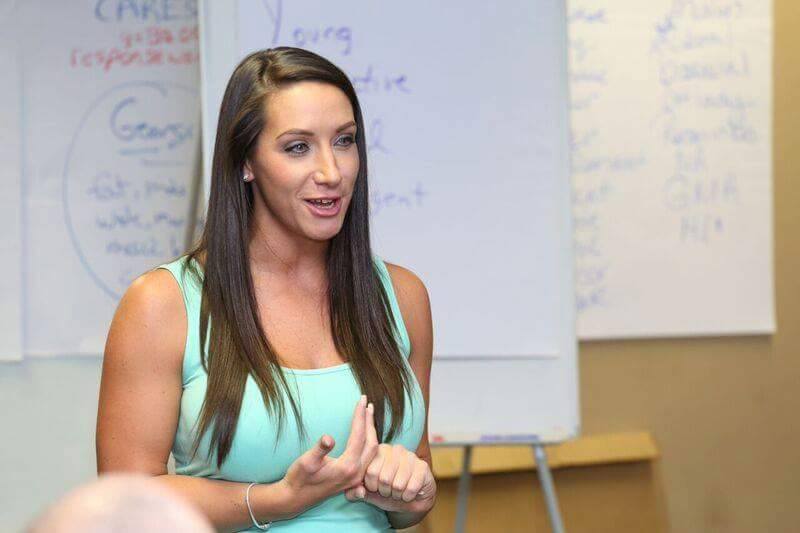At 54, Lorenzo Hardy finally feels like a productive member of society. He usually wears a three-piece suit — fedora and all, fluently discusses civil disobedience theory, and estimates that he has read more than 2,000 books. He is also a twice-convicted felon, three years out of prison after a 20-year sentence.
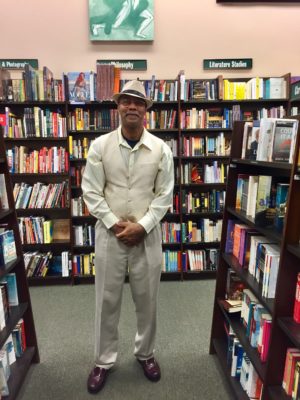
Hardy served two decades in federal prisons. When he was released in July 2014, he knew he needed a plan to cope with his past — both his life working the streets and his mental health challenges. Three months later, he earned a Certified Peer Specialist (CPS) certification from the state and began working with inmates whose experiences hit close to home for him. He helps them in their recovery and re-entry into society.
Hardy works under the state-funded Forensic Peer Mentor program. It currently pairs 12 paid peer mentors who have experience of incarceration, mental health conditions and substance use disorders with 202 inmates facing the same challenges. As inmates transition back into the community, mentors link them with resources to help them find housing, employment and community support to deal with their illness or addiction.
“When you get out of prison, you’re like a newborn child with adult responsibilities,” he says. “It’s overwhelming.”
A persistent need
In 2006, about half of the prisoners in the United States had some form of mental illness, the Department of Justice estimated. And though evidence varies, the rate of such illnesses among incarcerated people is consistently higher than among the general public.
At least 16 percent of Georgia inmates had a mental illness diagnosis in 2014, according to the Department of Behavioral Health and Developmental Disabilities (DBHDD), and experts say diagnosis and treatment of mental conditions lag far behind the actual prevalence of these conditions in correctional facilities.
Research suggests that substance use disorders are even more prevalent. States that were known for tough incarceration policies in the 1980s and 1990s began pushing for change later, after finding that their prisons were turning into overcrowded and fiscally inefficient treatment centers for mental illness and addiction — even as many state psychiatric hospitals across the country began shutting down.
After enacting criminal justice reform legislation in 2012, Georgia led the way through accountability courts, peer mentor programs and re-entry services, according to an Urban Institute report. Since then, rates of people going to prison or on probation have decreased, according to the report, and so have recidivism and crime rates, according to the Georgia Department of Corrections and the GBI.
As the state’s criminal justice reforms continue to expand, the numbers of forensic peer mentors and participants are expected to double, according to the Georgia Mental Health Consumer Network. The consumer group partnered with the Georgia Department of Corrections and the DBHDD to execute the peer program.
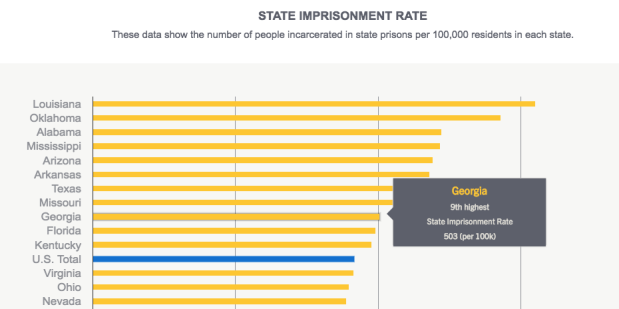
The program matches volunteer inmates who have an upcoming expected release date with peer mentors who can help link them with logistical re-entry planning, emotional support and long-term recovery tools to facilitate their transition away from prison life.
Hardy helps his caseload of 20 mentees find resources for necessities such as housing and employment.
As a CPS, Hardy also guides current inmates through recovery options on the outside, like community mental health providers, and helps them create individualized recovery plans that lay out each person’s potential “triggers,” goals and coping strategy.
The prison system is “designed to degrade, humiliate and punish you,” Hardy says. So a lot of his job involves negative thought correction, getting men to look beyond their troubled histories and focus on their human value and potential.
“I am a man,” Hardy says. “Not a convict, criminal, black, poor, or rich man — just a man.” And he tries to get his guys to see themselves the same way.
But one of the biggest parts of his job is providing hope, says Hardy, who through his own recovery has learned to cope with persistent depression, anxiety and post-traumatic stress disorder. That can be tough when a big part of his job is listening to and empathizing with others’ mental health challenges, and the burnout rate can be a limiting factor in recruiting more qualified peer mentors.
But Hardy prides himself on being able to offer something to inmates that he wishes he’d had on the inside. He takes strides toward self-care, knowing how tenuous his own road to recovery can be. But he also knows the inmates he works with need to take hope from someone like him, who has street and prison cred but made it to “the other side of the bars” successfully.
“We all know what it’s like to hear that door close behind you,” he tells his mentees. “But I’m your tomorrow and you’re my yesterday.”
An idea gaining support
Peer mentorship isn’t new. But the combined mental health and substance use treatment and logistical support for people transitioning out of prison is a relatively new concept. Some state prisons offer individualized addiction treatment plans, but the forensic peer program is the only state resource that combines peer-to-peer recovery and logistical support during incarceration and after release, according to the Corrections Department. Several other states, including New York, Ohio, Pennsylvania and Oregon have seen success with peer mentor re-entry programs.
Most forensic peer mentors have several certifications, including CPS and Certified Addiction Recovery Empowerment Specialist, or CARES, which can help increase understanding and empathy between peers with concurring mental health and substance use disorders, says Neil Campbell, director of the Georgia Council on Substance Abuse.
“The ‘secret sauce’ could be someone developing a relationship with a CPS and CARES before they get out,” she says. “Not that it’s the only solution, but it helps.”
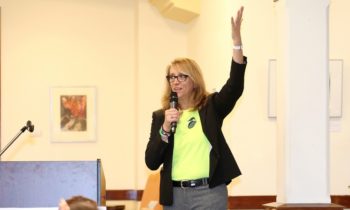
Current forensic peer mentors work in various locations. Most work at state prisons where the inmates they help are still incarcerated, others work out of daily reporting centers for the recently released, some are assigned to state psychiatric hospitals or a transitional center. Their efforts amount to more than 10,000 phone or in-person contacts since July 2017.
Research suggests peer mentorship encourages recovery, and the added logistical support helps people secure adequate housing and access to benefits, according to Campbell.
Georgia currently terminates Medicaid, the federal-state health coverage program for low-income people, when a person is incarcerated. But Gov. Nathan Deal’s Council of Criminal Justice Reform recently recommended suspending Medicaid instead, to reduce bureaucratic hurdles after an inmate’s release. Ensuring a smooth resumption of health benefits for people with mental health or addiction challenges is crucial, says Campbell.
Almost 60 percent of current program participants after release are employed and have been able to secure stable housing. Thirty percent are actively enrolled in community mental health services.
“Forensic support asks, ‘What are barriers to a positive re-entry process that maybe your case officer or probation officer doesn’t have time to do?’” she says. “Let’s be intentional about your fears — do you need medication or a driver’s license?”
Peer mentorship is not designed to replace therapy or medical care, but aims to complement clinical care by providing mentees with a partner who understands their experience.
“We don’t fix, we just give empathy,” Hardy says. But he also teaches coping tools, he says. Each mentee creates a personalized Wellness Recovery Action Plan, with guidelines on what to do if crises hit. It’s a toolbox for pre-crisis coping, so there is a paper trail when times get tough during the transition, Hardy says.
As of 2014, 27 percent of state prisoners landed back behind bars within three years. In the past year, only three forensic program participants have been rearrested, and none have gone back to prison in the program’s short history, according to DBHDD, which funds the program.
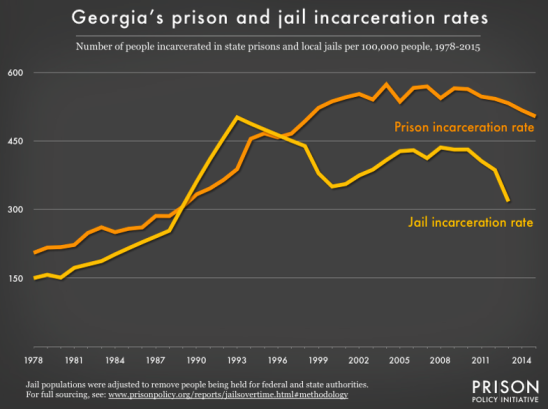
Overall, the state’s criminal justice reforms have begun lowering prison populations, dedicating more space to housing serious offenders, and quelling recidivism rates, according to the council. And all these hopeful trends have been especially pronounced among African-Americans, who historically have been disproportionately represented among the state’s prison population.
But Georgia still has the nation’s ninth-highest per capita incarceration rate, even though the prison population and crime rates have declined here in the last few years.
Currently, about one in 200 Georgians are in state prisons. Since 2010, Georgia has reduced its inmate population by about 3,400 while the total number of people living in the state has grown significantly, according to the U.S. Bureau of Justice Statistics. Though black Georgians are still incarcerated three times more often than whites, the rate of African-Americans going into prison is dropping faster than the overall decrease in new prisoners.
As Hardy points out, all felons face the same struggles in returning to their communities. Re-entry into a society that seems to say, “You are never done serving time,” is a perennial challenge. Ex-inmates can face trouble with job and housing applications, as well as bureaucratic battles over basic necessities like identification. But there’s hope, Hardy adds.
Hardy sees practical living skills as essential for these men in moving forward. For example, when you’re serving time, “you are taught to be good — not how to bank.” So Hardy initiated a Salvation Army budgeting class at the Buford-based Phillips Transitional Center to help inmates get away from survival mode and toward thriving, he says. He gets and stays on the men’s level, and communicates with them as a peer, which is something most of these men have never experienced, he says.
From addiction to action
As Hardy was just beginning his job as a CPS, Lindsey Sizemore, now 30, was working the program from the inside.
Sizemore was sitting in the DeKalb County Jail awaiting trial, when a caseworker told her about a recovery-focused program similar to the one Hardy runs. Something clicked. For the first time in her life, Sizemore confronted her past, her addiction and mental health struggles — and her hope for recovery. When she was partnered with a sponsor as part of her recovery, she felt loved and supported.
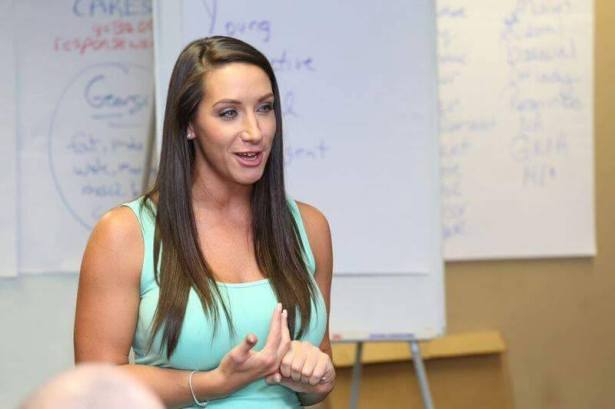
Sizemore’s childhood was full of abuse and trauma. When her parents divorced, her father left and her mother developed a drinking problem. Soon her mom was arrested, and Sizemore lived with friends to finish high school. Though she graduated with honors, by the time she was handed her diploma she had already tried every hard drug she could find, overdosed and been in a nearly fatal car crash.
Afterward, she started working in the Atlanta club scene, and later moved up to a bartending position. And though she was partying hard, it seemed like normal behavior among her co-workers and friends. Her drug use escalated into an opioid addiction through the next half-decade, and eventually she was fired. Soon after, she found herself evicted and homeless, all the while suffering through withdrawal seizures.
“I know what it’s like to sleep in a laundromat and steal food — I didn’t have a plan past 24 hours,” Sizemore says. “I hated the drugs, but I was suffering from withdrawal and I was sick in the prison I created for myself.”
Coupled with the sickness and homelessness, she was also ashamed. She knew she could do better than her dead-end existence. Though she’d long since lost a cellphone number or any way to contact her family, she craved love and validation — something to make her life feel worthwhile, she said, though she didn’t know how to begin reaching out.
Cut off from her family, she lived and worked on the streets for the next few years, using heroin regularly, until a federal plainclothes unit tackled her in a hotel room and took her into custody. At 24, she went to jail for the first time. Sixty days later, she was out on bail.
After years of chasing the next high, living on the streets and dodging a few charges of pushing drugs for bigger dealers, she finally reconnected with her family. Things were beginning to look up. But then, on Sizemore’s 25th birthday, she found out that her mother, who also had a history of battling addiction, had taken her own life.
Sizemore spiraled deeper than ever into the grip of heroin. She says that in those first days of grief, and even during her mother’s funeral, she was so high that she barely remembers a thing. A few days later, DeKalb County caught up with her and so began her 24-month stay in the county jail.
By the time she was tried, convicted of several drug trafficking felonies and sent to Arrendale State Prison in 2014, the forensic program had officially launched, and Sizemore jumped at the opportunity to be one of the first recipients.
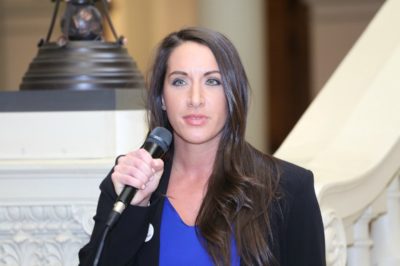
Through her incarceration and transition to a halfway house, Sizemore tirelessly worked the program. The forensic support kicked in and helped her find housing and recovery resources.
“I took classes and realized that you can change things as an inmate,” she says. “I started writing the warden about how physical works goes hand in hand with recovery,” and lobbied the prison for more exercise equipment.
Sizemore felt empowered for the first time. “Once I knew I was worth it, I stopped screaming at everybody and started listening.”
The program became such a part of her life that she applied to become a CPS herself. She passed the training, added a CARES certification a few weeks later, and then was offered a job supporting recovery efforts at Georgia Mental Health Consumer Network.
She has rebuilt relationships with her father and other family members, who have supported her through recovery.
Five years sober and helping others on their journey away from prison and into recovery, Sizemore acknowledges how many problems remain for former inmates seeking to lead normal lives. Acceptance into society does not come easily. She herself has been denied some housing opportunities due to her criminal record, and though she now lives and works in Decatur, she is frustrated that there is not a greater range of job opportunities for people in her position.
But Sizemore is hopeful that peer mentor programs are helping. It was just what she needed to turn her life around, she says. “It helped me see that I had hope and a future.”
Erica Hensley is a freelance health care journalist based in Athens.

